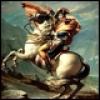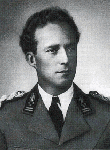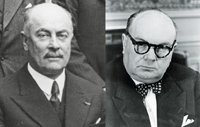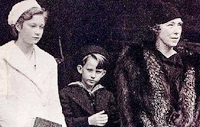"Belgian Royal Question" - the Abdication Crisis of King Leopold III of the Belgians
Marengo

Marengo is a history student from Amsterdam with a special interest in Portuguese, Napoleonic and Dutch royals.
View all articles by MarengoBackground
 Leopold III of the Belgians (pictured at left) was never an easy person; his sister Queen Marie-José of Italy once described him as being an arrogant and impatient man. His ministers found this out very quickly when King Albert I died in a tragic accident and his son Leopold III ascended the throne in 1934 at the age of only 32. The Belgian constitution gave the King many more powers than those of other monarchies in the 1930s. King Albert I was always wise enough not to use these constitutional powers to the fullest extent, but his son was cut from different cloth. He intended to let his voice be heard. Neither did Leopold III inherit his father's tact in dealing with his government ministers, although he could be very charming to them when it suited him. During the six years of his reign before the German invasion, Leopold would try to get around his ministers and attempted to extend his constitutional powers to the utmost. He sometimes openly disparaged some of his ministers, which was not appropriate for a constitutional monarch. By doing this he shattered the constitutional unity of government and King - the result was a crisis of confidence. That the Belgian fascist movement saw Leopold as the strong leader they were looking for did not help his image either, although Leopold never showed any interest in the fascist movement.
Leopold III of the Belgians (pictured at left) was never an easy person; his sister Queen Marie-José of Italy once described him as being an arrogant and impatient man. His ministers found this out very quickly when King Albert I died in a tragic accident and his son Leopold III ascended the throne in 1934 at the age of only 32. The Belgian constitution gave the King many more powers than those of other monarchies in the 1930s. King Albert I was always wise enough not to use these constitutional powers to the fullest extent, but his son was cut from different cloth. He intended to let his voice be heard. Neither did Leopold III inherit his father's tact in dealing with his government ministers, although he could be very charming to them when it suited him. During the six years of his reign before the German invasion, Leopold would try to get around his ministers and attempted to extend his constitutional powers to the utmost. He sometimes openly disparaged some of his ministers, which was not appropriate for a constitutional monarch. By doing this he shattered the constitutional unity of government and King - the result was a crisis of confidence. That the Belgian fascist movement saw Leopold as the strong leader they were looking for did not help his image either, although Leopold never showed any interest in the fascist movement.
On 10 May 1940 Hitler declared war on the neutral Benelux countries and invaded Belgium. Like his father in 1914, Leopold III immediately took supreme command of the Belgian army. At 7 a.m. he said goodbye to his ministers in a gloomy meeting. He refused to appear in Parliament, unlike his father, who had done so in 1914. The blitzkrieg did not give him the luxury of spare time to attend to such ceremonies, but his enemies would claim later that this refusal was the first in a long chain of traitorous actions. The war went disastrously for the Belgian troops and their allies. On 25 May the King issued a proclamation to his troops: "Officers, troops, whatever happens, I will share your destiny." He probably modelled his behavior after that of his father, who stayed with his troops during World War I while his ministers left for France. His people probably expected Leopold to share their fate too. With King Albert I's heroic behavior still fresh in everybody's memories, they would probably have called Leopold a coward if he had done anything other than to share the fate of the troops.
 The relations between Leopold and his government went sour in the first week of the invasion; the government headed by Prime Minister Hubert Pierlot and Foreign Affairs Minister Paul-Henri Spaak were at odds with the King and his reactionary advisers. The ministers were worried about the defeatism at Leopold's quarters, and they saw his retreat as a sign that he wanted to break with the allies. When Leopold declared that he should share the same fate as his troops and stay with them after the capitulation, his ministers were even more shocked. They wanted him to go to England like Queen Wilhelmina of The Netherlands and become the symbol and focus of Belgian resistance. Pierlot issued a memorandum to the King where he pointed out that it was the task of the government to decide how to handle this matter, not the King, and they wanted the King to go to London.
The relations between Leopold and his government went sour in the first week of the invasion; the government headed by Prime Minister Hubert Pierlot and Foreign Affairs Minister Paul-Henri Spaak were at odds with the King and his reactionary advisers. The ministers were worried about the defeatism at Leopold's quarters, and they saw his retreat as a sign that he wanted to break with the allies. When Leopold declared that he should share the same fate as his troops and stay with them after the capitulation, his ministers were even more shocked. They wanted him to go to England like Queen Wilhelmina of The Netherlands and become the symbol and focus of Belgian resistance. Pierlot issued a memorandum to the King where he pointed out that it was the task of the government to decide how to handle this matter, not the King, and they wanted the King to go to London. German Invasion
On 24 May, the last meeting between Leopold III and his ministers took place. Pierlot pointed out to the King that capitulation was a matter for the Belgian government, not for the King, to decide; he also requested again that the King go to London. Leopold III, however, said that he had decided to stay, more for sentimental reasons than political ones. Wouldn't he be known as a deserter when he left the country? "Whatever happens, I have to share the same fate as my troops." He later declared in a letter to George VI of Great Britain that it was his duty to stay with his troops and to try to do as much for his countrymen as he could. At the end of the meeting the King said something that probably sealed his future fate: he told his ministers that he intended to stay in Belgium, as King. The baffled ministers understood this to mean that the King intended to form a new government and that he would reign as a sort of vassal of Hitler. They reacted with words like treason, disgrace, and desertion. The Prime Minister made it clear that the government would openly distance itself from the King: "we know that this is without a precedent and against the traditions of the public laws, but we don't see another option," Pierlot said. The breach between the King and his government was complete; the ministers went to France while the King stayed in Belgium. Three days later, Leopold agreed upon a complete surrender of the Belgian forces to avoid further needless bloodshed. The Belgian government (now in France) issued another statement: "In the name of the Belgian people, under art. 82 of the constitution, taking in account that the King is under control of the invader, the ministers decided in a council that the King is not fit to rule."
The allied governments showed their disapproval of Leopold´s actions too. Only a few hours after Leopold surrendered, French president Paul Reynaud spoke on the radio: "in the middle of the battle, without any consideration and without any notice to his British and French allies, King Leopold III of the Belgians laid down his arms." Belgium's allies were treacherously left in the lurch, "an event without precedent in history." A few hours later, Pierlot went on French radio too, to accuse the King of separate negotiations with the enemy and to state that Belgium could not be held responsible for the actions of one man. On 4 June Sir Winston Churchill spoke in the House of Commons about Leopold, where several times he was interrupted by MPs screaming "disgrace" and "treason." In Belgium a famous poet declared that even the name Judas was too good for this King. Political cartoons showed Leopold III stabbing John Bull in the back, and in London several spiritualists declared that the spirit of Leopold's deceased wife Astrid appeared as she was upset about the "dishonesty" of her husband. Speculation about the King reached feverish heights: Was Leopold under the influence of his German mother or his fascist Italian sister? Did he dream about establishing a fascist state in the Benelux, of which he would become King-Dictator? Did the real Leopold die at Kussnacht with his wife Astrid and was this a German look-a-like impersonating the King?
The allied propaganda machine worked overtime to slander Leopold III as much as they could. The allies now had a scapegoat, and public outrage against the Belgian King might increase morale in France and England. Reynaud knew perfectly well that the Leopold had no other option than to surrender to the Germans; further bloodshed would have been useless. The King had informed the French and British troops about the surrender, and even Pierlot became upset at the French and British bending of the truth: "we were angry and outraged," he later said. Historians later agreed that it would have been useless to fight on: what use would it be to sacrifice two million people in West Flanders? Maybe more time for the French and British troops to get away from Dunkirk? The allegation that the King was negotiating with the Germans was less unfounded; he certainly left that impression during his last meeting with his ministers. Still, this anger against the allies did not keep Pierlot from calling the King a traitor during his radio speech on 28 June. Leopold III never forgot the humiliations he suffered during those days. He would never forgive his ministers who spoke this way, and from now on he would act independently, not taking any advice from his government in Paris and later in London.
The King returned to Laeken Castle as a prisoner of war. Here he and three councillors wrote a proclamation to clear his name: "contrary to what is said, the King did not negotiate with the enemy, he did not sign a treaty or an agreement with them. The only order he gave was to lay down their arms, but that was a military command." Others spoke out too; Cardinal de Roey wrote that the King did not sign a treaty with the Germans and that his wish to stay with his troops as a prisoner of war was very honourable. Many Belgians agreed, officers renewed their oath to the King, and 90% of the Belgian mayors signed a petition of loyalty to the King. The people posted letters of sympathy to Laeken Castle and delivered flowers at the gates to show their respect for the King's courage.
In France Pierlot and his government saw that Western Europe had been conquered by the Germans completely and tried to make amends to their King. Would it be possible for them to return to Belgium and form a new government? Leopold showed his stubborn nature; he was insulted by his ministers, and they were mistaken if they thought they would be forgiven this easily. His reply was short: "The situation of the King is unaltered; he does not engage in politics and does not receive politicians." This refusal left the ministers with no other option than to move to London, where they could continue their work representing the independent Belgium. From the time of their arrival in London, they were confident about an Allied victory and soon were treated with respect by the allies. The main problem, however, had not been solved: to clear the name of Belgium, the ministers also had to clear the name of their King. They knew that most of the population remained loyal to the King, so the government wanted to make amends. Pierlot and Spaak helped to build Leopold's reputation as a heroic prisoner of war and even said that the Belgians should support their King. But they had no idea what Leopold was doing in Laeken. He refused to reply to their messages and stayed cool toward them. What was he doing in the castle? Was he collaborating, did he oppose the Germans, or had he decided to just shut his mouth and wait to see how things would go?
 Meanwhile, Leopold continued to live as a prisoner of war at Laeken. The castle was guarded by German officers, and the King was allowed to see only a few people each day. He could leave the palace only with an escort of Nazis. His mother, Queen Elisabeth, lived at Laeken too, and Leopold was visited by his sons every fortnight, as they lived in Ciergnon Castle. His daughter, Josephine-Charlotte, was attending a boarding school in Brussels. Still, the King was not as much of a prisoner as people believed; he was able to make trips to the beach, Paris, and elsewhere. He nevertheless had a hard time dealing with his position and fell into a deep depression.
Meanwhile, Leopold continued to live as a prisoner of war at Laeken. The castle was guarded by German officers, and the King was allowed to see only a few people each day. He could leave the palace only with an escort of Nazis. His mother, Queen Elisabeth, lived at Laeken too, and Leopold was visited by his sons every fortnight, as they lived in Ciergnon Castle. His daughter, Josephine-Charlotte, was attending a boarding school in Brussels. Still, the King was not as much of a prisoner as people believed; he was able to make trips to the beach, Paris, and elsewhere. He nevertheless had a hard time dealing with his position and fell into a deep depression.
